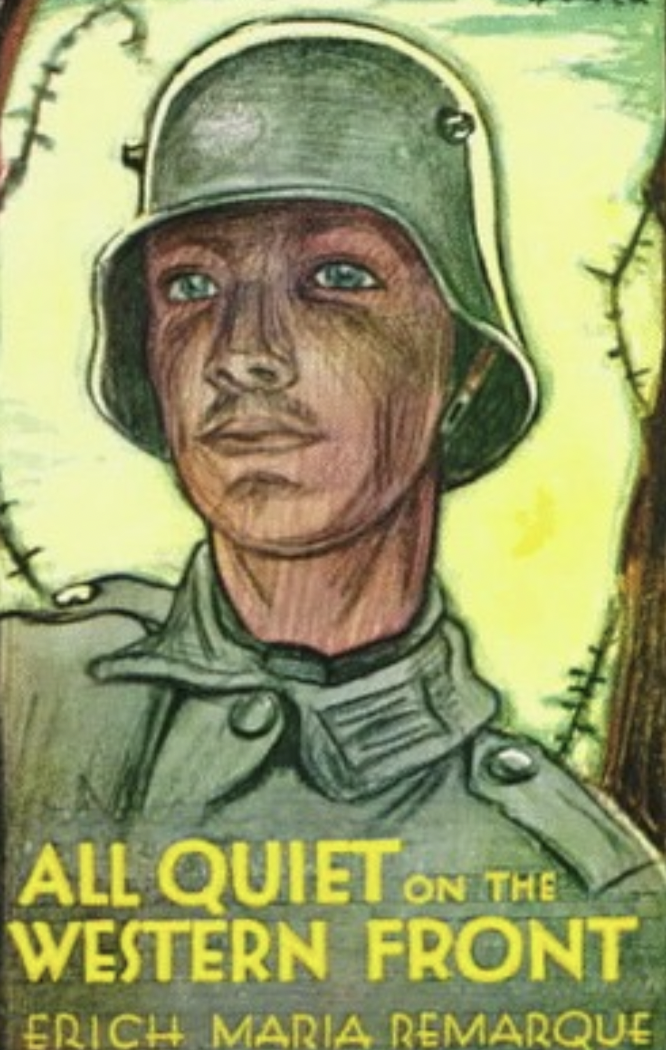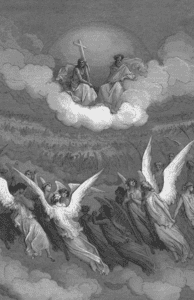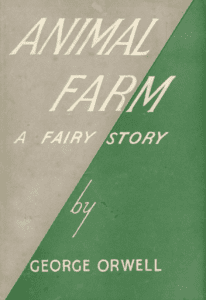Author: Erich Maria Remarque, a German veteran of World War I.
Written in Germany by a World War I veteran, this novel strips away the idealism, glory, heroism and patriotism of war, exposing the stark reality and horror underneath. The first person narrator Paul Bäumer volunteers for the army after high school with fellow-students Kemmerich, Kropp, Müller, Leer, and Behm – the first to die; influenced by school-master Kantorek. Paul remarks unhappiness in the world is often brought on by small men like Kantorek and Paul’s superior Corporal Himmelstoss.
At rest five miles behind the war-front, Paul’s company enjoys extra rations due to the reduction of their numbers to eighty from one-hundred and fifty. Tjaden, the skinny locksmith who eats big and wets bed, and Haie Westhus, a large peat-digger, are of Paul’s age. The peasant Detering has left behind his farm and wife. Group-leader Katczinsky is a cobbler aged forty.
The men relieve themselves together under open sky, while gossiping and playing cards as in a common-room. Innocent recruits become hardened and jaded in months. Paul feels they should have guides to the world of maturity, – work, duty, culture, progress. Instead, they realize the previous generation in authority have less insight and can be trusted less than their own.
Their experiences teach that death is a far greater thing than duty to one’s country. When Kemmerich loses his foot, Müller eyes Kemmerich’s fine boots. Though he appears insensitive, Müller would rather go barefoot than take Kemmerich’s boots, if Kemmerich can use them. Kemmerich subsequently dies, hospital orderlies hurrying to give his bed to patients lying on the floor. Kantorek calls them ‘Iron Youth’, but they feel like old folk, – practical and realists.
Nothing ties the youth to their previous life like those with a background – wives, children, occupations and interests. The army and their brothers-in-arm become their whole world, wondering how they can return to civilian life. Patriotism has lost its meaning, – the classical conception of Fatherland dissolved into a ritual of salutes and parade-marches; being trained for heroism like circus ponies.
Katczinsky postulates the lower a man’s station in civilian life, the more ruthless he becomes with power. They are harassed and brutally overworked by Himmelstoss, a postman turned Corporal, – probably sensing defiance. The defiance starts in earnest with tripping a latrine-bucket over Himmelstoss’s legs. One dark night, Himmelstoss is trapped and beaten with head covered and pants pulled down.
Katczinsky has an uncanny ability to find food under all circumstances. He believes that if all the ranks in the army are given the same food and same pay, the war will soon be over. Kropp wishes the ministers and generals of warring countries would fight in an arena to determine the outcome of war.
To Paul, the front is a whirlpool sucking him inescapably into itself. The soldiers are protected from shell-fire by hugging mother earth. In the trench, a terrified new recruit creeps into Paul’s arms like a child, Paul reassuring him he is not the first man to soil his underpants after his first bombardment. Tjaden hangs a boot-polish lid with a wire on a candle in which they throw the hundreds of lice crawling over them. The trench-rats are fat and evil. This war is waged with machine guns, gas and bombs, killing masses remotely. Bayonets have almost gone out of fashion, their place taken by sharpened spades.
Sometimes worn-out barrels make them end up shelling their own men. They are wild beasts fighting merely to save themselves from annihilation. Some new recruits go raving mad after enduring endless hours of shelling. The dead are piled unburied. Their number dwindles to thirty-two.
Colored posters of pretty girls in the army theater seem unreal. They spend happy hours with French country-girls, – a very different experience from soldiers’ brothels with long queues. At home on leave, Paul feels a complete disconnect from his earlier life. Visiting class-fellow Mittelstaedt in the barracks, Paul observes with glee Mittelstaedt tormenting Kantorek, his subordinate, using language Kantorek had used; calling him “inadequate” while praising the erstwhile school-porter. Paul visits Kemmerich’s mother, annoyed by the grief for one individual when thousands fall daily. Paul’s dying mother has saved whortleberry preserve for him and has exerted herself to get him two pairs of woolen underpants.
The French peasants are no different from German peasants. The Russians from the prison camp next door with honest peasant faces scavenge garbage for food. Paul reflects that a word of command has made them the enemy, and another command may make them a friend. The war is useful only to emperors and generals. Paul instinctively kills a French soldier who enters his trench, and is struck by remorse. Finding the picture of the man’s wife and child, he resolves to help them after the war.
Assigned to guard an abandoned village, they live in luxury with real beds and freshly cooked food, amidst constant shelling. Paul and Kropp are injured while evacuating a village. The clean white hospital bed-linen is in sharp contrast to Paul’s muddy shirt unwashed for six weeks. Early morning litany irritates them, but the sisters refuse to shut their door till Paul smashes a bottle. The red-cross voluntary aid sisters are unskilled but cheerful, while the solemn nuns have more expertise. Paul recovers from surgery, while Kropp’s leg is amputated. Thousands of shattered young bodies lie in hospitals of the warring countries, with minds full of fear and despair.
Detering is court-martialed when he runs away from acute homesickness, seeing a blossoming cherry tree. Müeller is shot dead, the others starved and weakened from dysentery. Leer bleeds to death from a hip wound. Katczinsky is hit in the leg while finding food. Paul carries him to be treated, but finds him dead on reaching, hit in the head by a splinter.
The only incident not narrated by Paul is his own demise in October 1918, on a day that saw so little fighting, the army report merely stated: All Quiet on the Western Front.




